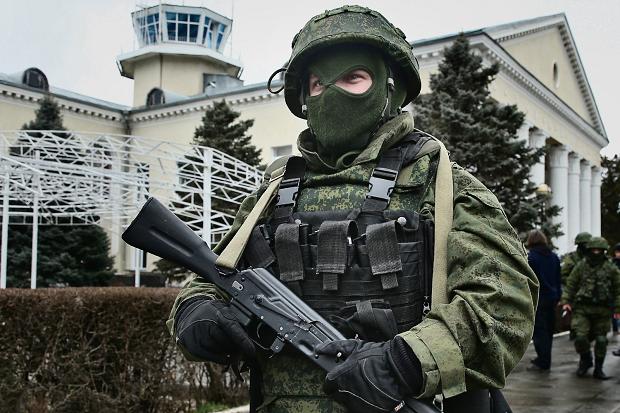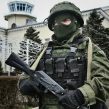
Russia Puts Itself in Peril by Dismembering Ukraine
Publication: Eurasia Daily Monitor Volume: 11 Issue: 45
By:

One unique feature of the still surging crisis in Ukraine is the intensity of high-level communications between the key parties to it—which should have eliminated the possibility of misunderstanding, but apparently has not. Last Friday night (March 7), United States President Barack Obama had yet another hour-long conversation with Russian President Vladimir Putin—and again failed to impress upon his counterpart that the West is serious about securing Ukraine’s territorial integrity (https://newsru.com/russia/07mar2014/phonecall.html). At every turn of the spiraling confrontation, Western leaders have been trying to leave Putin an opportunity to back off gracefully without losing too much face; and they are quite puzzled that their increasingly stern warnings are having the opposite effect, propelling Putin to take another step up the ladder of escalation (Kommersant-FM, March 7). Indeed, last Friday, the Russian parliament emphatically expressed support for the Crimean authorities’ decision to hold a local referendum on March 16 about whether the peninsula should secede from Ukraine and accede to the Russian Federation (https://lenta.ru/articles/2014/03/07/rewrite/).
Russia’s stubborn advance along the path of high risk and mounting costs might appear irrational, but in fact, it is driven by the logic of Putin’s maturing regime, which needs to find new sources of populism to maintain its legitimacy as economic stagnation cuts into the government’s ability to keep serving “free lunches” (Novaya Gazeta, March 5). Putin sought to make his ambitious Eurasian integration project into an ideological narrative that would add credibility to his enervating regime. But this led to his first mistake of blocking Ukraine’s long-prepared, though in the short term not particularly meaningful, associating agreement with the European Union. The explosion of public protests in Kyiv conjured the specter of a similar revolution at the Kremlin walls. Meanwhile, a fear of unpredictable swings in public mood (rooted in the shock experienced by one mid-career KGB operative stationed in the disobedient Dresden in November 1989) caused Putin’s second mistake of granting generous support to Ukrainian President Viktor Yanukovych. Fierce clashes in Maidan brought Yanukovych down, but Putin saw in that breakdown of police power a plot orchestrated and sponsored by the West, and so made his third mistake of unleashing the full fury of state propaganda against the “extremist usurpers” (https://russ.ru/Mirovaya-povestka/Utro-vtorzheniya-zavtra).
This self-induced hysteria inspired the Kremlin’s compelling need to thwart the West’s malicious “conspiracy” in Ukraine and prompted Putin to order the deployment of a “limited contingent” into Crimea, which appeared to involve a minimal risk of violence and to generate maximum enthusiasm in Russia (https://lenta.ru/columns/2014/03/02/jump/). Both assessments were proven correct, but the expectation that such a determined move would encourage pro-Russian sentiments in eastern and southern Ukraine, where support for the Maidan protesters was respectively 8 percent and 20 percent, was completely false (https://www.levada.ru/03-03-2014/otnoshenie-zhitelei-ukrainy-i-rossii-k-sobytiyam-v-ukraine). Ukraine is deeply offended by the military intervention and is building resolve to stand firm against this violation of its sovereignty, re-discovering the feeling of national unity (https://grani.ru/opinion/portnikov/m.226309.html). The new government of Ukraine may be a random assemblage of odd characters (see EDM, March 5), but it seems to have risen to the challenge and is gaining both domestic authority and international recognition (see EDM, March 6), thus rendering Putin’s invectives about an “illegitimate coup” irrelevant.
One point that Putin internalized from his conversations with Western leaders was that the military intervention has destroyed all of Russia’s political levers for manipulating the internal divisions in Ukraine. So at a press-conference last Tuesday (March 4), he opted for blunt denials of any presence of Russian troops outside the naval base in Sevastopol (Novaya Gazeta, March 7). That attempt at re-defining the reality on the ground left Russian paratroopers patrolling Simferopol in a dubious status of “little green men,” but it could not change the position of the US, the EU or, for that matter, Turkey, who insist that any expression of “free will” by Crimea in the situation of de-facto military occupation has no credibility whatsoever. The barely camouflaged course to fast annexation of the Crimean peninsula unites in condemnation and rejection every stake-holder in the European security system—including such key Russian allies as Kazakhstan. And this puts Moscow’s pivotal Eurasian project in limbo (Nezavisimaya Gazeta, March 6).
Some Russian experts have started calculating how many billions of US dollars it would cost to transform Crimea into a subject of the Russian Federation—adding the sums to the losses from punishing economic sanctions that could be enforced by the EU (https://www.forbes.ru/mneniya-column/mir/251764-krym-tsena-imperializma). Russia is, indeed, so open to economic interactions with Europe that well-targeted sanctions could produce a sequence of crippling impacts, while Gazprom’s threats to turn off the flow of natural gas to and through Ukraine could expose the monopoly to an intolerable squeeze on sensitive assets of both a corporate and personal nature (https://www.gazeta.ru/business/2014/03/07/5939593.shtml).
The economy will deliver its punishment for Moscow’s policy of arrogant disregard of international norms of behavior, but it moves slowly and cannot check the self-propelled escalation of the crisis. The political mobilization in Russia around the nationalist anti-Western cause has proceeded so far that even tactically expedient back-pedaling becomes particularly difficult, as such moves open the space for doubt in the hyped-up society about whether the leaders know what they are doing. Putin’s confused narrative, particularly his reflections on US experiments in Ukraine—“as if with rats”—conducted without concern about the consequences for such rhetoric, betray his inability to comprehend what is really happening with Russia’s most important neighbor. Neither can he acknowledge that in the course of a few weeks his regime has evolved from a corrupt but “enlightened” autocracy to a police state where no dissent is tolerated and basic freedoms are severely curtailed (https://slon.ru/russia/gleb_pavlovskiy_eto_faktory_pereformatirovaniya_ne_prosto_vnutrenney_politiki_rossii_a_stroya_rossii-1067665.xhtml).
Russia has swiftly become a true “rogue state,” and the jingoist fervor does not give it pause to think about the repercussions of this status. As Putin rides the wave of aggressive “patriotism,” he cannot turn away from committing the gravest in his chain of mistakes—the annexation of Crimea. Ukraine is gathering energy and gaining support for resisting this outrageous dismembering, but Russia is sinking into a perilous crisis. In the disoriented society, the first reaction to international ostracism is defensive, and this gives the delusional regime more time to commit mistakes that could yet again push Russia beyond the brink of state failure.




